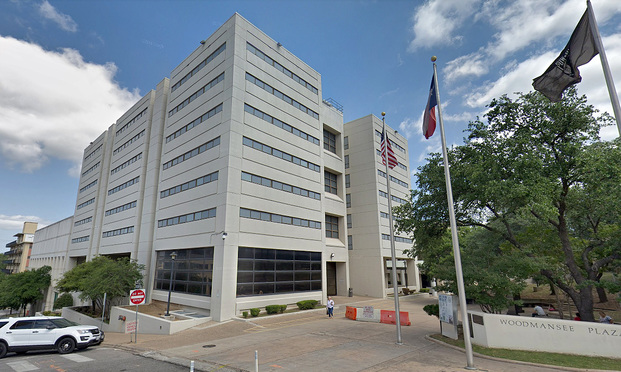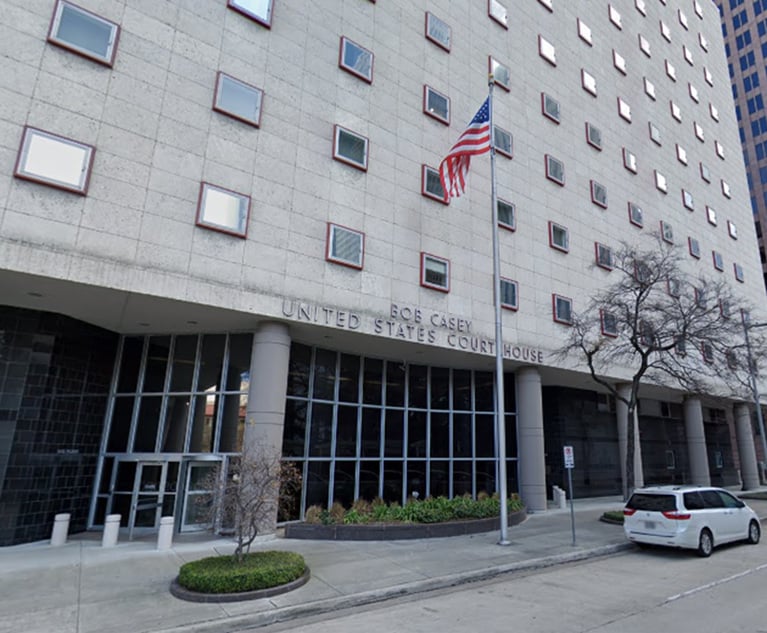Now Trending: 'Zoom Kiosks' to Breach Digital Divide Between Public and Remote Courts
In what could be the start nationwide trend, two Texas counties are among courts in at least four states that are creating public computer stations for litigants to connect to video conference court proceedings. It's a solution to concerns that the digital divide could bar some people from remote court.
May 29, 2020 at 03:11 PM
3 minute read
 Travis County's Blackwell-Thurman Criminal Justice Center, Austin, Texas. Photo: Google maps
Travis County's Blackwell-Thurman Criminal Justice Center, Austin, Texas. Photo: Google maps
Zoom stations are popping up in the Travis County criminal courthouse in Austin.
Complete with computer, webcam, microphone—plus hand sanitizer and gloves—the Zoom stations will allow unincarcerated criminal-defendants to join remote plea hearings to resolve their cases, which have been put on hold since March, said Debra Hale, Travis County criminal court administrator.
Aside from Travis County, Harris County is exploring a similar idea.
"The county is investigating the ability to have computers or tablets at local libraries or JP courts to increase remote access for the litigants and the public," said Harris County's COVID-19 operating plan.
Remote court proceedings have become nearly ubiquitous across the United States because of shuttered courthouses in the COVID-19 pandemic. But there is a growing concern that the digital divide would leave some people out of the courts' technological revolution.
In what could be the start nationwide trend, these Texas counties are among courts in at least four states that are creating public computer stations for litigants to connect to video conference court proceedings.
Aside from Texas, video conferencing kiosks are popping up across Idaho—in libraries, conference centers, fair grounds and courthouses—plus in an Illinois county's law library and some Iowa courthouses, said Danielle Hirsch, principal court management consultant with the National Center for State Courts in Denver.
She thinks the Zoom kiosk idea will keep spreading across the nation.
"The primary solution for those kiosks is to make sure, in an increasing attention to remote proceedings and remote pleadings, that people for whom—either their internet is not strong enough to participate remotely, or they don't have enough cell phone minutes or data, or they just have technical illiteracy—that they are not barred from the court," Hirsch said.
Although some of the defendants who use Travis County's new Zoom stations may lack access to technology to connect to a remote hearing, breaching the digital divide wasn't the immediate goal of launching the project.
Hale, the court administrator, explained that social distancing isn't possible in the small elevators or stairwells of the nine-story Blackwell-Thurman Criminal Justice Center in Austin. That's why judges will do the plea hearings over Zoom.
However, judges still needed defendants to appear at the courthouse in-person. They must sign their names and give their fingerprints after entering their pleas.
There will be deputies and court staff on the first floor, where the Zoom stations will be set up, to help the defendants connect to their hearings. Stations will be in private rooms with closed doors for confidential attorney-client communications.
To make sure that there are not too many defendants appearing at the same time, Hale said the criminal courts will operate on staggered schedules.
"I feel good about it, because first of all, we're focusing on those defendants who want to take care of their cases, and we are allowing them the opportunity to do that. We're providing a lot of assistance on the first floor," Hale said. "We're meeting all the requirements for COVID compliance: We have masks and gloves and hand sanitizer, and distancing when people are waiting."
This content has been archived. It is available through our partners, LexisNexis® and Bloomberg Law.
To view this content, please continue to their sites.
Not a Lexis Subscriber?
Subscribe Now
Not a Bloomberg Law Subscriber?
Subscribe Now
NOT FOR REPRINT
© 2025 ALM Global, LLC, All Rights Reserved. Request academic re-use from www.copyright.com. All other uses, submit a request to [email protected]. For more information visit Asset & Logo Licensing.
You Might Like
View All
Houston-Based Law Firm Overcomes Defamation Suit for Website Warning
3 minute read
Houston Law Firm Files $250K Breach of Contract Suit Against 2 Former Lawyers
3 minute read

Texas Bankruptcy Judge Withdraws Ethics Complaint Against Jackson Walker
2 minute readTrending Stories
- 1Lawyers' Reenactment Footage Leads to $1.5M Settlement
- 2People in the News—Feb. 4, 2025—McGuireWoods, Barley Snyder
- 3Eighth Circuit Determines No Standing for Website User Concerned With Privacy Who Challenged Session-Replay Technology
- 4Superior Court Re-examines Death of a Party Pending a Divorce Action
- 5Chicago Law Requiring Women, Minority Ownership Stake in Casinos Is Unconstitutional, New Suit Claims
Who Got The Work
J. Brugh Lower of Gibbons has entered an appearance for industrial equipment supplier Devco Corporation in a pending trademark infringement lawsuit. The suit, accusing the defendant of selling knock-off Graco products, was filed Dec. 18 in New Jersey District Court by Rivkin Radler on behalf of Graco Inc. and Graco Minnesota. The case, assigned to U.S. District Judge Zahid N. Quraishi, is 3:24-cv-11294, Graco Inc. et al v. Devco Corporation.
Who Got The Work
Rebecca Maller-Stein and Kent A. Yalowitz of Arnold & Porter Kaye Scholer have entered their appearances for Hanaco Venture Capital and its executives, Lior Prosor and David Frankel, in a pending securities lawsuit. The action, filed on Dec. 24 in New York Southern District Court by Zell, Aron & Co. on behalf of Goldeneye Advisors, accuses the defendants of negligently and fraudulently managing the plaintiff's $1 million investment. The case, assigned to U.S. District Judge Vernon S. Broderick, is 1:24-cv-09918, Goldeneye Advisors, LLC v. Hanaco Venture Capital, Ltd. et al.
Who Got The Work
Attorneys from A&O Shearman has stepped in as defense counsel for Toronto-Dominion Bank and other defendants in a pending securities class action. The suit, filed Dec. 11 in New York Southern District Court by Bleichmar Fonti & Auld, accuses the defendants of concealing the bank's 'pervasive' deficiencies in regards to its compliance with the Bank Secrecy Act and the quality of its anti-money laundering controls. The case, assigned to U.S. District Judge Arun Subramanian, is 1:24-cv-09445, Gonzalez v. The Toronto-Dominion Bank et al.
Who Got The Work
Crown Castle International, a Pennsylvania company providing shared communications infrastructure, has turned to Luke D. Wolf of Gordon Rees Scully Mansukhani to fend off a pending breach-of-contract lawsuit. The court action, filed Nov. 25 in Michigan Eastern District Court by Hooper Hathaway PC on behalf of The Town Residences LLC, accuses Crown Castle of failing to transfer approximately $30,000 in utility payments from T-Mobile in breach of a roof-top lease and assignment agreement. The case, assigned to U.S. District Judge Susan K. Declercq, is 2:24-cv-13131, The Town Residences LLC v. T-Mobile US, Inc. et al.
Who Got The Work
Wilfred P. Coronato and Daniel M. Schwartz of McCarter & English have stepped in as defense counsel to Electrolux Home Products Inc. in a pending product liability lawsuit. The court action, filed Nov. 26 in New York Eastern District Court by Poulos Lopiccolo PC and Nagel Rice LLP on behalf of David Stern, alleges that the defendant's refrigerators’ drawers and shelving repeatedly break and fall apart within months after purchase. The case, assigned to U.S. District Judge Joan M. Azrack, is 2:24-cv-08204, Stern v. Electrolux Home Products, Inc.
Featured Firms
Law Offices of Gary Martin Hays & Associates, P.C.
(470) 294-1674
Law Offices of Mark E. Salomone
(857) 444-6468
Smith & Hassler
(713) 739-1250






